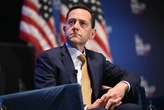Hello and welcome to Modern CEO! I’m Stephanie Mehta, CEO and chief content officer of Mansueto Ventures. Each week this newsletter explores inclusive approaches to leadership drawn from conversations with executives and entrepreneurs, and from the pages of Inc. and Fast Company. If you received this newsletter from a friend, you can sign up to get it yourself every Monday morning.
When Matt Garman interned for Andy Jassy at Amazon Web Services (AWS) in 2005, the unit was still considered an internal startup and had yet to begin selling IT infrastructure services to other companies. Twenty years later, Jassy is president and CEO of Amazon, and Garman is CEO of AWS, which last year reported revenue of $107.6 million—nearly 17% of the e-commerce giant’s 2024 sales. With long tenures at one company growing increasingly rare, I asked Garman, who had worked at startups before joining AWS and had initially planned to return to a smaller company, what kept him at Amazon for so long. “I found that I could actually have more freedom to build here at Amazon than I had at a startup,” he says.
Amazon’s ability to mint new products and services at scale—early in Garman’s time at AWS, the unit launched Simple Storage Services, or S3; Amazon Elastic Compute Cloud (EC2); and Amazon Simple DB in quick succession—is attributable to its distinctive and “peculiar” culture. From the outset, founder and executive chair Jeff Bezos emphasized tenets such as customer obsession, frugality, bias for action, ownership, and hiring great talent. These evolved into a set of leadership principles that guide the company.
MEETINGS WITH BEZOS
For some, the environment can be incredibly energizing. Garman, for example, says he learned quickly that good ideas matter more than hierarchy. “When I was an intern, I had a couple of meetings where I presented to Jeff Bezos, and he didn’t care that I was an intern,” he recalls. “He cared that I had interesting or good ideas . . . and we debated those. That, to me, was impactful because . . . I didn’t have to check with my boss or boss’s boss. He wanted to get ideas directly from me.”
That kind of information gathering among senior leaders and employees drives the way Amazon operates. “You’re making decisions based on the actual data and not high-level distillations of the data,” Garman says. “If you just get a polished or shiny version of the truth through several layers, you’ll make worse decisions because you won’t know all of those specifics.”
But Amazon’s culture isn’t for everyone. Leaders expect employees to be in the office “consistently, five days per week,” and Garman has said that workers who disagree with the policy should move on. “We think that [in-person collaboration] is important to our customer; we think that’s important to the future innovation and the culture of our company,” he told The Wall Street Journal editor-in-chief Emma Tucker earlier this year. “It doesn’t mean that that’s the only decision you can make, but it is the decision that we’re making. And if it’s not for you, then that’s okay, you can go and find another company if you want to.”
For those early-career employees who stay, there’s always a chance that one of them will someday occupy Garman’s seat. When asked whether a future AWS CEO might be a current intern, he lit up: “I think so. I think part of the benefit that we have is we give people so many opportunities to learn and grow in all stages of their career.”
Leaning into AI
Like most tech CEOs, Garman is especially occupied with Amazon’s artificial intelligence developments and investments, which range from its Trainium custom chips to applications like Rufus, an AI-powered shopping assistant that helps customers discover and evaluate products through natural conversation. When I asked Garman how he would advise other CEOs to approach AI, he was blunt: “It’s super important to lean into it and learn the technology. If you resist it and say, ‘I’m going to wait and be a late adopter,’ it’s probably going to be too late because there’s a real flywheel effect of adopting some of this technology early.”
HOW PECULIAR IS YOUR CULTURE?
What are your company’s leadership principles or values, and how do they drive the way you operate? Send your ideas to me at [email protected]. I’ll feature some of the most compelling examples in a future newsletter.
Read more: the path to the top
Honeywell International’s CEO was shaped by his time in the field
Why former CFOs are finding success as CEOs
Principal Financial Group’s CEO rose from intern to chief executive








No comments